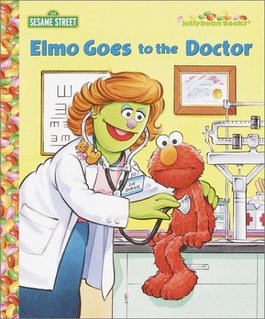One Child/Multiple Patients: Parents in the ED
 I bought this book as part of a Sesame Street series for my first daughter back in the early '80s and now I find it on a "review of antique books" site! Good grief! If this is an antique then I'm a pre-historic relic.
I bought this book as part of a Sesame Street series for my first daughter back in the early '80s and now I find it on a "review of antique books" site! Good grief! If this is an antique then I'm a pre-historic relic.
Being a nurse never helped me as a parent. When my first baby ran a temperature of 104.8 I ran to the ER as fast as I could get my old VW bug to fly. When I found my 2-year-old son blue and drooling on the side of my bed after a febrile seizure, we went 911 all the way. Of course by the time I had #3, I was an ER nurse and an experienced parent. She never even saw the inside of an ER until she was 14 and that was only because she was having an allergic reaction.
I know what it is like to be absolutely terrified because your child is sick.
In the ED, the child may be ill but you are caring for the parents as well. I find parents fall into three categories:
- The Newbie: a parent who is dealing with a sick child for the first time. They have no clue about what to do for the fever and they are frantic because the child vomited once and has not stopped crying/fussing. They truly feel this is an emergency. They did not call the pediatrician, having rushed to the ER after the first emesis. They usually have at least one grandmother with them for support. The child is dressed in a diaper, a onesie, a second onesie, a one piece sleeper with footsies, a sweater, a jacket with hood and a thick flannel blanket. They are scared to death.
- The Walking Worried: They've been through this before, only the fever keeps coming back when the Tylenol wears off and the vomiting has been going on "all day". They called the pediatrician and have an appointment for tomorrow but they are too worried to wait that long. There may be new symptoms with this illness or it may have come on very suddenly. They've gone through all the treatments they can do at home (ie nebulizer treatments) but their gut tells them something is not quite right or the child is no better. They aren't panicky, but they are anxious.
- The Veterans: They've seen it all. The kids are older, or the child is the youngest in the family. They can handle the usual stuff at home, so the child will be in with asthma exacerbation, an orthopedic injury or a laceration. They're concerned, but not anxious.
- Acknowledge that the parents are concerned/worried/anxious.
- Begin treatment at triage. If appropriate, give the medications for fever allowed by the triage protocol. If the child will need to wait to be seen, let the parents know that the fever is being addressed while they are waiting.
- Tell the parents that if they become worried about their child while waiting, you (the triage nurse) are available. This will help allieviate some of their anxiety about waiting.
- Reassure the parents that although the patient seemed deathly ill at home but is now playing peek-a-boo with the respiratory therapist and trying to stand on their head on the gurney, this is not unusual for children and we do believe their story...
- Discuss the care for the illness as you care for the child. For example, talk about the need for minimal clothing in the presence of a fever as you undress the child for a weight. Go over what a clear liquid diet consists of when offering the child Pedialyte.
- Encourage the parents to ask questions if they are concerned about an aspect of care.
- Be sure to reinforce aspects of care that the parents did right. This is especially important for new parents who may not be confident in their ability to care for a sick child.
- If the parents are very anxious, they may not retain a lot of what is discussed. Let the parents know that everything will be written in the discharge instructions given at the end of the visit.
- Discuss options for care of future illnesses at discharge. The parents may not realize that there is a doctor on call for their pediatrician 24 hours a day and they are able to give out telephone advice. They may utilize an advice line after hours. During office hours, their pediatrician may be able to fit them in to a same-day appointment. It is important that the parents are not made to feel that bringing their child to the emergency department was wrong.











6 Comments:
Great post. I love reading your blog - I learn something new every time!
I learn something too, Kim. I have been at all the levels of parenting you mentioned. It is never easy when you have to bring a child to the hospital for any reason. Sometimes the parent(s) need more care than the child, no?
All I can say, Kim, is "right on." :) I'm showing my age, I know...but I began to understand how to deal with upset parents intuitively when I became a mom. The key for me is to find the place in my heart where I am a parent. Sometimes administrators in various environments (juvenile justice, education, mental health agencies) forget the common ground and become so focused on their "goal" (whatever that may be in each situation) that they lose sight of that.
All is well though: I would say at least half of the junior and senior classes at my school are parents.
What a fabulous post. Over the years I have moved from newbie to veteran. Experience so helps in being a parent.
~Deb
I guess I expected something different when I saw this post's title. I see too many histrionic parents, too many families where the children are the adults by default, too many who don't have a clue about child rearing just like their parents before them were clueless too.
I think it will help I was a parent (and my kids are now--nearly--grown) before I was a nurse. I was a pretty mellow parent, but think--no, I know--that life-experience will help me as a(n older) new nurse.
Hh
Post a Comment
<< Home